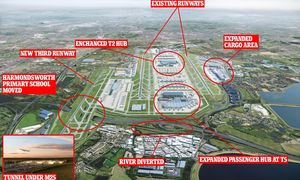Donald Trump kicked off his second term as President of the United States, taking office on January 20, 2025, with elevated public approval compared to his earlier administration. According to recent polling by Reuters, 47% of Americans expressed support for Trump, marking his highest popularity since he initially took office. This stands in stark comparison to former President Joe Biden, whose approval rating plummeted to 37% at the end of his term, the lowest he experienced during his time as president. Trump's moment of re-entry was backlit by strong sentiments among voters, particularly related to his tough immigration policies.
The immigration stance taken by Trump has evidently found traction among many Americans. The same Reuters poll revealed significant support for drastically reducing the number of migrants allowed to claim asylum, with 58% of respondents endorsing such measures. This perspective echoes frustrations stemming from the Biden administration's tenure, which saw approximately 8 million illegal immigrants enter the country. Despite this evident support, only 46% approved of Trump's handling of immigration, illustrating the complexity of public sentiment as he navigates various policies.
Nonetheless, Trump’s second term has not been without controversy. For one, he faced backlash for his decision to pardon the nearly 1,600 individuals involved in the January 6, 2021, Capitol riot. A substantial 58% of Americans indicated they disagreed with Trump’s pardon decisions, leaving him to grapple with mixed responses to his actions as he stepped back onto the political stage.
Trump's high-profile return to the Oval Office also included the signing of executive orders aimed at revoking many of Biden’s policies. Among the changes, Trump disbanded the President’s Committee on the Arts and the Humanities (PCAH), originally reestablished by Biden. This committee, which advises the president on cultural and educational policy, had previously seen all its members resign in protest of Trump’s response to the events at the Charlottesville rally back in 2017. Trump’s swift move to dissolve the PCAH on his first day back has drawn sharp criticisms, especially from those who advocate for support of the arts and humanities.
Political analysts have noted the mixed receptions surrounding Trump's decisions. Jacob Rubashkin, from Inside Elections, remarked on the relative success of Trump's approval ratings, stating, "Yes, it’s positive for Trump, but it’s roughly in line with what we saw during the first term—a historically low approval rating at the outset of a presidency." Historically, new presidents often enjoy ratings above 50%, with Trump entering this term still tethered to the lows seen during tumultuous events from his first time around.
Adding to the complexity, Trump has continued to signal his intention to surveil his enemies through the judicial system, likely capturing Biden's attention and prompting him to execute pardons of his own before leaving the White House. Biden's last-minute pardons took the public by surprise, as he granted clemency to family members and key figures, including Dr. Anthony Fauci and those involved with the House investigation of the January 6 events.
Despite these actions and the surrounding controversy, Trump continues to push forward with his agenda. Among his early plans is the establishment of a major outdoor sculpture garden intended to celebrate influential figures connecting culture, literature, and arts—an endeavor he hopes to honor by 2026 for the U.S. semiquincentennial. Figures such as Billie Holiday, Woody Guthrie, and other icons from various sectors of American history would be memorialized, indicating Trump's strategic pivot toward embracing his cultural impact.
While critics of his administration express concerns over the continued disbanding of committees intended to promote the arts, Trump has showcased determined commitments toward funding his envisioned cultural tribute. The juxtaposition of Trump's actions reveals the disconnect between his targets for prioritization and public expectations for cultural support.
With such contrasting sentiments and actions marking the onset of his second presidency, Trump's political strategy will continue to elicit heated debate as he engages with opposing sentiments and policy challenges. The reactions to his early decisions lay bare the divided opinions surrounding his leadership style and the path forward for his administration.



